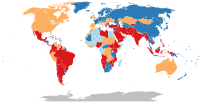
Photo from wikipedia
We agree that prioritising patient care in the response to the COVID-19 pandemic has led to justifiable disruption to medical education, prompting innovative and adaptive methods of teaching from medical… Click to show full abstract
We agree that prioritising patient care in the response to the COVID-19 pandemic has led to justifiable disruption to medical education, prompting innovative and adaptive methods of teaching from medical educators.1 In a July 2020 address to the Royal College of Physicians, the Secretary of State for Health and Social Care stated general practioner (GP) consultations in the UK should be delivered remotely by default for the foreseeable future. As final-year medical students, we would like to share our experiences of the recent changes to undergraduate medical education and primary care delivery, particularly the rapid increases in the use of telephone triage and remote primary care consultations during the COVID-19 pandemic. Medical education can shape and influence a student’s career choice,2 so appropriate exposure to each speciality is crucial in this decision-making process. Primary care placements typically allow students a unique opportunity to practise history taking for a wide range of presenting complaints and communication skills in the management of chronic conditions. This environment also provides time to safely perform clinical examinations during student-led consultations and allows for immediate feedback from the supervising clinician to facilitate effective learning. However, face-to-face patient encounters across both primary and secondary care have been significantly limited by COVID-19, resulting in reduced diversity of clinical learning experiences. Although remote consultations differ from in-person care, they have bridged the current gap in clinical education. After receiving training from our medical school, we were immersed in the world of remote primary …
Journal Title: Postgraduate Medical Journal
Year Published: 2020
Link to full text (if available)
Share on Social Media: Sign Up to like & get
recommendations!